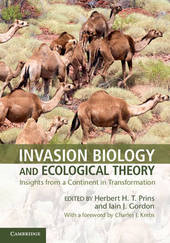
|
Invasion Biology and Ecological Theory: Insights from a Continent in Transformation
Hardback
Main Details
| Title |
Invasion Biology and Ecological Theory: Insights from a Continent in Transformation
|
| Authors and Contributors |
Edited by Herbert H. T. Prins
|
|
Edited by Iain J. Gordon
|
| Physical Properties |
| Format:Hardback | | Pages:540 | | Dimensions(mm): Height 253,Width 180 |
|
| Category/Genre | Applied ecology
Management of land and natural resources |
|---|
| ISBN/Barcode |
9781107035812
|
| Classifications | Dewey:333.9523099 |
|---|
| Audience | | Professional & Vocational | |
|---|
| Illustrations |
27 Tables, black and white; 44 Halftones, unspecified; 17 Line drawings, unspecified
|
|
Publishing Details |
| Publisher |
Cambridge University Press
|
| Imprint |
Cambridge University Press
|
| Publication Date |
23 January 2014 |
| Publication Country |
United Kingdom
|
Description
Many conservationists argue that invasive species form one of the most important threats to ecosystems the world over, often spreading quickly through their new environments and jeopardising the conservation of native species. As such, it is important that reliable predictions can be made regarding the effects of new species on particular habitats. This book provides a critical appraisal of ecosystem theory using case studies of biological invasions in Australasia. Each chapter is built around a set of eleven central hypotheses from community ecology, which were mainly developed in North American or European contexts. The authors examine the hypotheses in the light of evidence from their particular species, testing their power in explaining the success or failure of invasion and accepting or rejecting each hypothesis as appropriate. The conclusions have far-reaching consequences for the utility of community ecology, suggesting a rejection of its predictive powers and a positive reappraisal of natural history.
Author Biography
Herbert H. T. Prins is Professor of Resource Ecology at Wageningen University. He was twice visiting professor with CSIRO and a Foundation Fellow of the Royal Melbourne Institute of Technology. He has conducted extensive fieldwork in environments ranging from savannas and rainforests, to mountains and the high arctic. Iain J. Gordon is Chief Executive and Director of the James Hutton Institute. He has an international reputation for scientific leadership and research excellence in interdisciplinary approaches to understanding socio-ecological system dynamics. He worked for CSIRO for seven years, managing major research portfolios on land management to protect the Great Barrier Reef and conserving Australia's biodiversity.
Reviews'This book represents a novel and exciting approach to testing some fundamental ecological ideas such as the niche concept, competition, disturbance, and life history strategy. It does so using invasive alien species, with Australia as both the invaded environment, as well as the source of the invasives. The approach taken is to propose a series of ecological hypotheses and test these against invader case studies ranging from the failed (finches) to the downright spectacular (water buffalo in Northern Australia). A series of specialist authors tackles each case study, before the editors, Prins and Gordon, conclude with a synthesis chapter that reviews the evidence for and against each hypothesis, drawing on each author's findings in a structured way. The principal intent of this book is to inform the science of ecology, but it is rich in valuable insights to those grappling with the management of this great threat to global biodiversity.' Mark Lonsdale, Commonwealth Scientific and Industrial Research Organisation, Canberra 'This book is both a reasoned call to action and a healthy antidote to hubris. Prins and Gordon assembled a team of authors to examine the history of biological invasions in Australia and undertake a bold test of what we think we know about invasion biology. They distilled that body of theory into eleven hypotheses about invasions in general, and each author tested the hypotheses independently using different historical and recent examples. Have a stiff drink ready for when you finish this book because it will shake your confidence in the idea that conservationists can or even should try to make predictions based on ecological theory. This is not as nihilistic a conclusion as might be assumed though because they also found the fate of invasive biota likely does not seem to simply be determined by chance either.' Conservation Biology
|